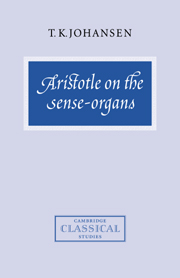3 - Hearing
Published online by Cambridge University Press: 22 September 2009
Summary
What is hearing?
The explanation of the faculty of hearing and its organ, the ear, follows the same pattern as the explanation of sight and the eye. We need to understand first of all what sound is, for sound as the proper object of hearing is the actuality that explains the potentiality of hearing. Once we know what the potentiality of hearing is we can explain the sense-organ as the matter required for the presence of this potentiality.
The production of sound
Sound is produced, Aristotle says at De Anima 11.8 419b4–7, by objects that are solid and smooth, a gong, for instance. Such objects are said to ‘have sound’ and to have the potentiality to make a sound. Aristotle explains the potentiality of such objects as the ability ‘to produce an actual sound in between itself and the sense of hearing’. So direct reference is made to the sense of hearing in this initial explanation of what a potentiality to make a sound is. The reference to the sense of hearing is obviously not just meant to locate the sound spatially, that is it is not just supposed to tell us that the sound occurs somewhere in between the sounding object and the sense of hearing.
- Type
- Chapter
- Information
- Aristotle on the Sense-Organs , pp. 148 - 177Publisher: Cambridge University PressPrint publication year: 1997



